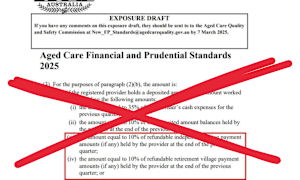A Special Commission of Inquiry into Healthcare Funding in NSW has recommended the State Government step in to provide additional aged care beds when bed shortages are impacting hospital operations and care.
Commissioner Richard Beasley, who led the inquiry over 70 hearing days and through consultation with policy experts, consumers, and NSW Health employees, wrote in the 1,062-page report, "On any given day, there are significant numbers of elderly patients occupying beds in public hospitals that could, if an aged care bed were available, be discharged.
"The high number of maintenance patients occupying hospital beds at any given time has financial implications for the NSW public health system, and creates risks for patients and staff.
"The large numbers of 'maintenance patients' also create bed block, impacting the ability of a facility to move patients through the hospital. This in turn can result in ambulance ramping or the treatment of patients in the waiting room, which may not be optimal for all patients and may be unsafe in certain circumstances.
"When elderly patients are in maintenance beds, they are not in the optimal environment they should be.
"Serious problems will continue to bedevil our public hospitals if something is not done urgently to address the lack of aged care beds available for the particularly challenging patients which the private market based providers will not accept.
"It is unrealistic to think that this problem can be solved without the State stepping in to play a greater role than it presently does in the aged care market – albeit it is entitled to be funded by the Commonwealth Government where it does so".
Among the report's 41 recommendations across 12 key areas, Commissioner Beasley recommended that when "an inability to access appropriate aged care" is having an "adverse impact on the delivery of acute care through public hospitals", NSW Health should "support or deliver the required aged care services".
Commonwealth funding for aged care should be pursued by the NSW Government, but "the provision of aged care to the extent required to relieve the existing and unsustainable burden on public hospitals should not await the outcome of those intergovernmental discussions", he added.
The report noted NSW Health concerns that stepping in to address the problem would be assuming responsibility for services that are the Commonwealth's responsibility and also "ancillary" to health services.
But it acknowledges: "State involvement in the delivery of aged care is not a radical concept."
"In this respect, Victoria has maintained a presence in the aged care market and, like private providers of aged care services, is funded by the Commonwealth to do so. NSW Health has also maintained a presence in the aged care market through Multi Purpose Services located in rural and regional areas, and Commonwealth funding is provided for these services."
The NSW Government is now considering the report and developing their response.










